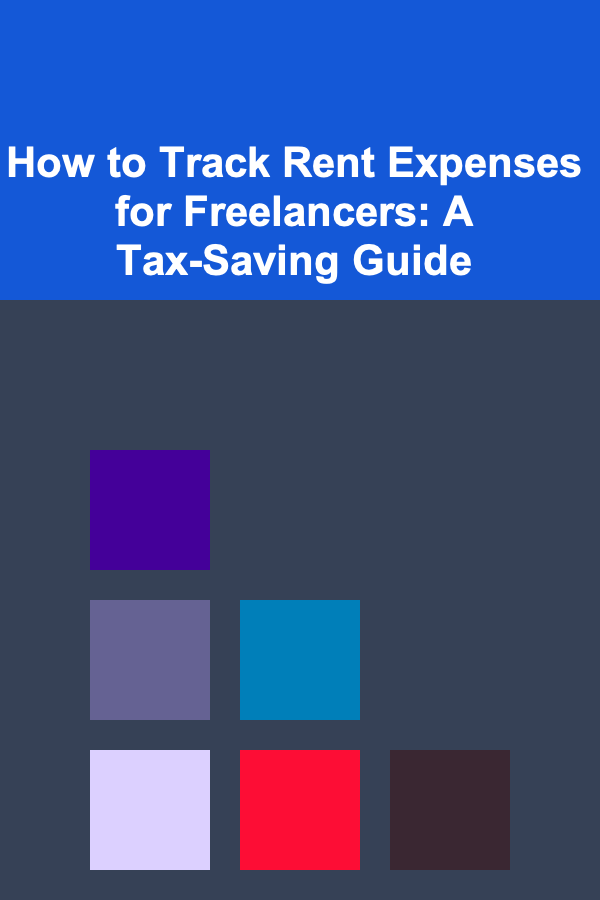
How to Track Rent Expenses for Freelancers: A Tax-Saving Guide
ebook include PDF & Audio bundle (Micro Guide)
$12.99$8.99
Limited Time Offer! Order within the next:

As a freelancer, managing your finances is critical for both the health of your business and your personal life. Rent, in particular, is one of the largest recurring expenses for most freelancers, especially those working from home or renting office space. However, tracking rent expenses isn't just about keeping an eye on your monthly cash flow---it can also play a crucial role in reducing your taxable income and saving on taxes, thanks to various deductions available to freelancers.
This article aims to provide an in-depth guide on how to track your rent expenses, with a particular focus on maximizing tax savings. We'll explore how to track rent properly, which tools and methods work best, how to calculate the deductions you're eligible for, and how to stay compliant with tax laws. Whether you're new to freelancing or an experienced independent contractor, this guide will help you understand how to leverage your rent expenses for significant tax savings.
Why Rent Expenses Matter for Freelancers
Rent is often one of the largest ongoing expenses for freelancers. Whether you rent an office space, use a dedicated room in your home as an office, or simply work from your living room, the costs associated with renting a workspace are a key factor in determining your overall business expenses. Freelancers may be eligible for tax deductions that allow them to reduce their taxable income by deducting a portion of their rent payments---either for home offices or business spaces.
Tracking your rent expenses accurately can lead to significant tax savings, but failing to keep precise records or claiming inappropriate deductions could result in costly mistakes. Hence, understanding how to document, calculate, and report rent expenses is crucial for tax purposes.
Types of Rent Expenses Freelancers Can Deduct
When it comes to tax deductions, the IRS allows freelancers to deduct certain expenses related to their rent. However, the rules can be complex and depend on whether you're renting a home office or office space. Here's a breakdown of the main rent-related expenses you can potentially deduct:
1. Home Office Rent Deductions
If you operate your business from home, you may be eligible to deduct a portion of your rent related to your home office. The IRS allows freelancers to claim home office deductions under two primary methods: the simplified method and the regular method.
- Simplified Method: Under this method, you calculate the deduction using a flat rate of $5 per square foot of your home office, up to 300 square feet. This is a straightforward approach and requires less record-keeping.
- Regular Method: This method requires a more detailed calculation. You need to determine the percentage of your home that is used for business purposes, then apply that percentage to your total rent. For example, if you use a 200-square-foot room in a 1,000-square-foot apartment, you could claim 20% of your rent as a business expense.
2. Dedicated Office Rent Deductions
If you rent a separate office space outside your home, you can typically deduct the full amount of rent you pay for the office. However, if the office is used for both personal and business purposes, you can only deduct the portion of the rent that directly relates to business use.
For instance, if you have an office that you use for both work and personal activities, you need to calculate the proportion of time the office is used for business and apply that percentage to your rent deduction.
3. Rent for Shared Office Space or Co-working Spaces
Many freelancers opt to work from co-working spaces or shared office environments. If you rent a desk, a small office, or a part-time membership in a co-working space, you can deduct these rental payments as business expenses, but only the portion related to your business activities.
It's important to note that certain co-working spaces provide additional amenities such as coffee, cleaning, and internet services. These expenses may also be partially deductible.
Tracking Rent Expenses: Best Practices for Freelancers
Tracking your rent expenses effectively is key to claiming tax deductions correctly and saving money on your taxes. The more organized and precise you are in tracking your rent expenses, the smoother your tax filing process will be. Below are practical strategies and tools to help you track rent expenses with ease.
1. Keep Detailed Records of Rent Payments
The first step to tracking your rent expenses is to keep a record of all rent payments you make. Whether you rent an office space, a co-working desk, or your home office, you need to keep copies of your lease agreements, payment receipts, or bank statements showing monthly rent payments.
For home office deductions, in addition to the rental payments, you'll also need to track the following:
- The size of your home and your office space (in square footage).
- The percentage of the space used for business.
- Any other related expenses such as utilities, insurance, and internet.
2. Use Accounting Software or Apps
One of the most efficient ways to track rent expenses is by using accounting software or expense tracking apps. These tools can help automate your financial record-keeping and provide detailed reports that are helpful when preparing your tax returns.
- QuickBooks: QuickBooks is one of the most popular accounting tools for freelancers. It allows you to create categories for different types of expenses, including rent. You can also link your bank accounts, automatically importing your rent payments to track them more easily.
- FreshBooks: FreshBooks is another excellent accounting tool for freelancers. It helps track expenses, generate invoices, and run financial reports. You can set up categories for different expenses, including rent, and track your expenses in real-time.
- Expensify: Expensify is an app designed to simplify expense tracking. You can scan receipts, categorize your rent payments, and generate reports, all from your smartphone.
- Wave: Wave is a free accounting software that freelancers can use to track their rent expenses and other business-related costs. It includes features like receipt scanning, invoicing, and accounting reports, all designed for freelancers and small business owners.
3. Set Up a Dedicated Business Account
If you haven't done so already, it's wise to set up a dedicated business account separate from your personal finances. This allows you to easily track business-related expenses, including rent. By maintaining a distinct account for your freelance activities, you can quickly identify which transactions are business-related and which are personal.
This separation helps avoid confusion when it comes time to file your taxes, and it also makes it easier to apply for business loans, credit lines, or grants in the future.
4. Track Rent with a Spreadsheet
For freelancers who prefer a DIY approach, using a spreadsheet is an effective and cost-free method to track rent expenses. By creating a simple Excel or Google Sheets document, you can manually input your rent payments, track other related expenses (such as utilities or office supplies), and calculate the total business-related rent deductions.
Ensure you include columns for:
- The date of the payment
- The amount of rent paid
- Any additional related expenses (utilities, property tax, etc.)
- The percentage of the space used for business (for home office deductions)
5. Consult with a Tax Professional
If you're unsure about how to track rent expenses or how to claim them on your taxes, it's a good idea to consult a tax professional. A tax advisor can help you ensure that you're tracking your rent expenses correctly and can provide guidance on the most tax-efficient ways to handle rent deductions.
Additionally, a tax professional can help you navigate complex situations, such as dividing rent between personal and business use or claiming rent for a shared office space.
Calculating Rent Deductions: How Much Can You Claim?
When it comes to claiming rent expenses on your taxes, the key is accuracy. Here's how you can calculate the appropriate deductions for home offices and other rental spaces:
1. Home Office Rent Deduction Calculation (Regular Method)
If you use the regular method, follow these steps:
- Step 1: Measure the total square footage of your home and your home office.
- Step 2: Divide the square footage of your office by the total square footage of your home. This gives you the percentage of your home used for business purposes.
- Step 3: Multiply that percentage by your total rent for the year. For example, if your home office is 200 square feet and your home is 1,000 square feet, you use 20% of your rent for business. If your monthly rent is $1,000, you can deduct $200 per month as a business expense ($1,000 x 0.20 = $200).
2. Home Office Rent Deduction Calculation (Simplified Method)
For the simplified method, you simply multiply the square footage of your home office (up to 300 square feet) by $5. For example:
- Step 1: Measure the size of your office (up to 300 square feet).
- Step 2: Multiply the number of square feet by $5. For a 200-square-foot office, the deduction would be $1,000 ($5 x 200).
3. Office Space Rent Deduction Calculation
For an office space that you rent separately from your home, you can generally deduct the full rent you pay for the space, as long as it is used solely for business. If the space is used both for personal and business purposes, you will need to calculate the percentage of time it is used for business and apply that percentage to your rent. For example, if your office space is used 75% of the time for business, you can deduct 75% of your rent as a business expense.
4. Co-working Space Rent Deduction
For co-working spaces or shared office environments, the process is similar to renting a dedicated office. You can deduct the full amount of rent you pay, but only for the business use of the space. For instance, if your membership includes access to amenities like a coffee machine or gym that you don't use for work, you'll need to adjust your deduction accordingly.
Conclusion
Tracking rent expenses is crucial for freelancers who want to save on taxes and ensure they remain compliant with tax laws. By keeping accurate records, utilizing accounting tools, and understanding how to calculate deductions, freelancers can take full advantage of tax-saving opportunities available to them. Whether you work from home or rent a dedicated office, managing your rent expenses effectively can help reduce your taxable income and free up funds for business growth. Always consult with a tax professional to ensure you're making the most of your rent-related deductions and keeping your financial records in order.
Reading More From Our Other Websites
- [Home Staging 101] How to Master the Art of Staging a Kitchen to Create an Irresistible Culinary Space
- [Mindful Eating Tip 101] Weekly Meal Planning with Mindfulness: Tips for Staying Present at Every Bite
- [Personal Investment 101] How to Use Real Estate Crowdfunding as an Investment Strategy
- [Home Rental Property 101] How to Choose Houses for Rent with a Screened Porch
- [Home Maintenance 101] How to Fix a Leaky Faucet and Save Water
- [Organization Tip 101] How to Simplify Your Wardrobe for Mindful Choices
- [Beachcombing Tip 101] Legendary Finds: Real Stories of Unexpected Beach Discoveries
- [Home Renovating 101] How to Incorporate Current Home Decor Trends into Your Renovation
- [Hiking with Kids Tip 101] From Crib to Summit: Real Stories of Parents Who Hiked with Babies
- [Personal Care Tips 101] How to Make Your Own DIY Makeup Remover at Home

How To Practice the Art of Not Reacting
Read More
How to Turn Your Garage into a Functional Living Space
Read More
How to Utilize Drawer Space for Laundry Accessories
Read More
Optimize Your Sleep for Better Productivity
Read More
Cashier Skills: How to Build a Resume That Stands Out
Read More
10 Tips for Planning a Milestone Birthday Party
Read MoreOther Products

How To Practice the Art of Not Reacting
Read More
How to Turn Your Garage into a Functional Living Space
Read More
How to Utilize Drawer Space for Laundry Accessories
Read More
Optimize Your Sleep for Better Productivity
Read More
Cashier Skills: How to Build a Resume That Stands Out
Read More